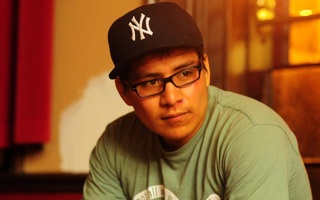With three million volumes and 65 miles of shelf space, it's not surprising that books occasionally get lost at Widener Library.
Still, librarian David R. Whitesell hardly expected to find undiscovered poetry by a world-renowned writer handwritten inside a book among the library's collections.
Visiting the stacks on a cataloguing question in December 1997, Whitesell ended up in the Latin American literature section. By chance, he picked up an attractive red book. What he found would change the next few years of his life.
Whitesell, a rare-book cataloguer for Houghton Library, opened the book and found an inscription from the author to Ruben Dario.
Dario, who wrote around the turn of the 20th century, is considered one of the foremost Spanish-language poets of all time.
"Two questions immediately came to mind," Whitesell said, "Where did Harvard get this book, since it most likely [originally] belonged to Dario? And did Harvard get any other books that Dario once owned?"
Given that Whitesell previously worked with a rare-books dealer, he knew that libraries tend to buy books in batches, making the single book even "more intriguing."
Once he flipped over the small red-bound book, Whitesell realized that its back was inscribed with Dario's name, the year 1901 and a title.
"The handwriting on the back was different from the presentation inscription, which was very curious," Whitesell said.
When he opened the back cover he found pages of manuscript poetry in the same handwriting--it appeared that Dario had written new poems on the blank pages of the slim volume.
"I was very intrigued and a bit skeptical," Whitesell said. "It didn't seem to be that I could just open a book and find manuscript poetry from Ruben Dario."
And so Whitesell replaced the book on the shelf and went home, "doing something I immediately regretted."
After the proverbial "sleepless night," Whitesell returned in the morning and compared the handwriting in the book to known samples of Dario's writing and found them to be identical.
"I looked at Dario's collected poems and found that two had been previously published," he says. "Here were the earliest known drafts with textual differences, but the final two I couldn't find anywhere. They were presumably unknown and unpublished."
To confirm his hunch that the University's holdings contained book's from Dario's personal library, Whitesell hunted through Harvard College Library's acquisition records and found correspondence between a book seller in Madrid and the University in 1916, the year of Dario's death.
"Using Hollis, I found all the books on the dealer's list of 180 that were bought by Harvard," Whitesell said. "It was a lot of detective work."
Whitesell then examined each book for signs that it once belonged to Dario, growing increasingly confident that at least 43 of the 180 had once been part of Dario's personal library.
According to Whitesell, there is a long tradition of Dario scholarship at Harvard. One of the first major studies on his work and the first bibliography on his works in the 1930s were both published at Harvard.
However, Whitesell noted ironically that even with the local interest in Dario, the books in his library were never studied.
"No one paid attention to them," he said.
Most of the books had never even circulated. However, one volume on versification--a Dario specialty--had been checked out by dozens of students. An inscription in the book reads "To Ruben" and a section in the book describes his poetry.
"Dozens of Harvard students have been studying from this book without realizing that 'Ruben' was Ruben Dario," Whitesell says.
According to Whitesell, Dario traveled widely and often left many belongings behind in each move. For scholars, an author's library represents a goldmine of information on his literary influences.
Houghton Library is exhibiting some of Whitesell's finds, including the volume with Dario's new poetry, through tomorrow. Whitesell intends to publish an account of the incident in the quarterly Harvard Library Bulletin.
Read more in News
McCain Trounces Bush, Gore Edges Bradley in NH PrimaryRecommended Articles
-
Toomey Easily Overcomes First Challenge in YearsIncumbent Timothy J. Toomey survived his first challenge in eight years yesterday, defeating Green Party candidate Paul E. Lachelier to
-
It's A Blog's LifeWhy would a person create a website that includes nothing more than their own ramblings and the daily events of
-
3 Decades Of History Online at IOP SiteHarvard’s Institute of Politics (IOP) brought heads of state and Nobel prize-winners one step closer to undergrads earlier this week
-
Clinton's Harvard Fans Head NorthNASHUA, N.H.—With the first presidential primary less than a year away, Harvard hopefuls traveled to New Hampshire on Saturday to
-
 Government Grants Temporary Visa to Junior Stuck in Mexico
Government Grants Temporary Visa to Junior Stuck in Mexico













